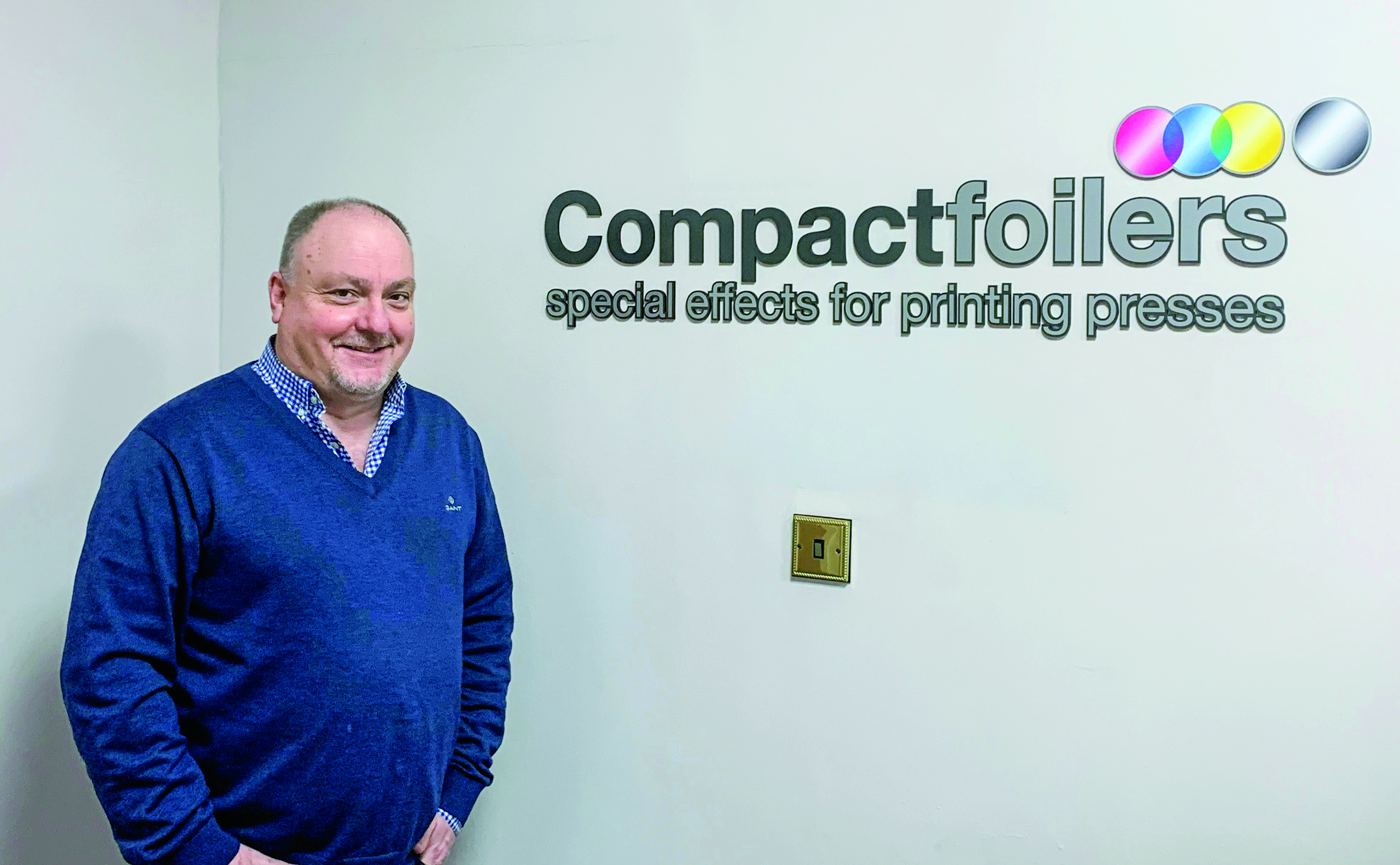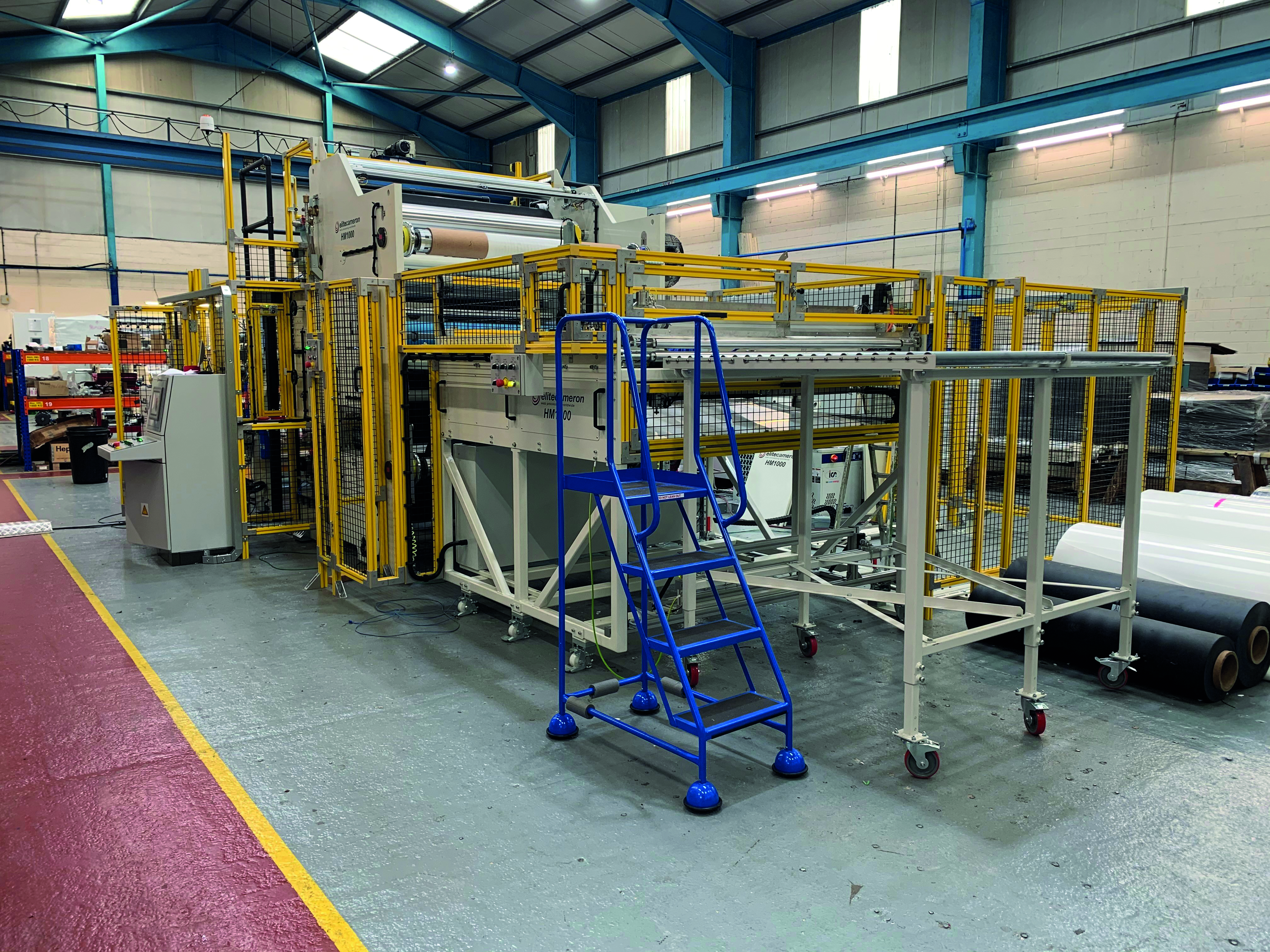There’s been an engineering works on Taunton’s Albemarle Road since Victorian times.
It was built in 1879 as a foundry, then as a company called Easton & Bessemer it built steam engines which powered the first paper-making machine as well as the electricity generator as Taunton became the first town in the UK to have electric street lighting. There’s a stone plaque proudly displaying a later name, ‘Easton & Johnson Engineers’, over the original front door, though there’s now a more modern extension to the side.
It’s been involved in engineering ever since, though the ownership and the product focus has changed over the years. The factory is now owned by TS Converting Equipment, a company best known for its two main product lines: a range of slitters and winders called Elite Cameron; and the Compact Foilers range of cold foiling machines for litho and flexo presses plus the Scodix inkjet digital embellishment presses.
TS stands for Tim Self, the director of the company. He says: “The factory had been through several ownership changes and various engineering activities over the years. In the 1970s it acquired the rights to manufacture Cameron winders, later proceeding to buy the USA-based licensor.”
Self started his working career as an apprentice at Cameron in 1979, later becoming an installation engineer, moving on to sales. Becoming “a little disillusioned with the company direction,” he left In 1985 and set up TS Converting Equipment Ltd, where he started to design his own range of slitting machines named Elite Converting Machinery. After 10 successful years he returned to his previous company, merging the ranges as the Elite Cameron range and becoming a 50% shareholder. Three years later he purchased the other 50% to take full ownership.
Today TS Converting Equipment turns over about £9m, split 50/50 between the Elite Cameron and Compact Foilers ranges. “Over 70% is exported, 50% of our orders are repeat customers,” says Self. “We have 35 staff, most of whom are based in Taunton. We have a subsidiary in the US and some remote-based service engineers.”
 The factory itself now comprises a two-storey modern office block with assembly area equipped with large 30-tonne overhead cranes, covering about 2,800sqm of industrial space.
The factory itself now comprises a two-storey modern office block with assembly area equipped with large 30-tonne overhead cranes, covering about 2,800sqm of industrial space.
TS Converting Equipment invests heavily in its web processing technology, with several patents on its products. “Everything is designed and developed in-house,” Self says. “The government’s incentive for R&D tax credit has really helped us to fund this capability. We choose to subcontract the component manufacture, through a great network of predominantly UK suppliers. We assemble, wire, write the software, test and install all around the world. We provide first-tier support using our own network of engineers. We then have a variety of trained, locally based sub contract engineers. Scodix supports all of our digital foilers directly.”
The past year has been a challenge for everybody, but Self is optimistic. “Pre-Covid we were shipping five to 10 Compact Foiler modules each month, with 95% overseas, and three to four Elite Cameron machines every month with 70% exported, 50% to repeat customers. This has reduced a little but seems to be picking up again.”
Elite Cameron’s slitter rewinders are the modern versions of a range first introduced in the 1930s, with more than 12,000 installations worldwide over many years. They can be used to reduce wide rolls of film, foil or paper down to multiple narrower rolls, with options for different width ranges (from 500mm to 4,000mm), heavy rolls, narrow widths, delicate materials and automatic turrets for continuous operation. The company has developed many unique features, including laser reel positioning, precise tension control and knife positioning systems that are also used on its foiling machines.
“We’ve got a great reputation for handling difficult materials, that may be thin, stretchy or brittle, often things that our competitors would shy away from,” says Self.
The company also makes hotmelt coaters, laminators, core cutters and shaftless or shafted unwind units (up to 4,000mm wide for speeds up to 2,000m/min).
The hotmelt coaters can be used for label work. For instance the HM300 is for small-scale, narrow- web work (up to 300mm webs at up to 100m/min), with options for coat weight measurement, slitting, edge trim, UV curing, rotary bar slot die, and lamination nip. There are also 550mm, 750mm and 1,650mm versions with speeds up to 300m/min.
TS Converting has partnered recently with another well-established UK manufacturer, Focus Label Machinery, subject of a Printweek Best of British story in February 2020. They offer a Focus flexo label press fitted with an Elite Cameron hotmelt coating module for inline manufacture of labels and tapes. The modular HM300 FLX has either two or four flexo print units, then can apply a release coating, flip the web over between any of the stations, hot melt coat, laminate in a face stock if required, die cut, slit and rewind all in one pass.
The LM hot and cold glue laminator series are mainly intended for industrial uses, such as self-adhesive, medical, automotive and aerospace industries.
The Compact Foilers range was a natural development out of the Elite Cameron customer base some 12 years ago. TS Converting Equipment supplies the hot and cold foil suppliers extensively, says Self. “I was visiting a foil supplier who subsequently introduced them to one of their customers, a German print finishing company called Koch & Glasder in Düsseldorf. They were experiencing multiple issues with another foiler that was supplied on a KBA press. Following a lengthy discussion with the K&G owners, we agreed to take our extensive foil processing knowledge and develop a foiler of our own, which became the start of the Compact Foiler brand. K&G immediately agreed to take the first unit on a sale or return basis. Four months later, the first module was installed and their problems were immediately resolved!”
 Compact Foilers was established in 2009 and TS Converting Equipment went on to design inline or offline modules for print enhancement of litho sheetfed and flexo web presses and later partnered with Scodix to supply its whole range of inline digital foiling modules.
Compact Foilers was established in 2009 and TS Converting Equipment went on to design inline or offline modules for print enhancement of litho sheetfed and flexo web presses and later partnered with Scodix to supply its whole range of inline digital foiling modules.
This proved good timing, as the commoditisation of ‘ordinary’ commercial and digital print has seen printers looking round for new services to offer. “We have found many commercial print houses that were struggling and looking to move in to new value-added markets,” says Self. “Print embellishment really opens up new avenues for them. The printed packaging markets have remained very strong as customers look to improve their products’ shelf presence. Digital is one of the most exciting areas as shorter runs with variable data are rapidly growing in demand. Our exclusive partnership with Scodix in Israel has been key to our success as they lead the digital embellishment sector.”
Half of the foiling models are fitted to new presses with the rest as retrofits, says Self. They have been fitted to Heidelberg, Koenig & Bauer, Manroland, Mitsubishi and Ryobi presses. “We provide full press integration without affecting the integrity of the press. Our units all have integrated reel loading and unloading to eliminate any heavy lifting. We fit all our own sensors and feedback and link to the press for safety systems. If we supply through a press manufacture we often integrate more of the controls on a case-by-case basis.
“Our main claim is that our modules integrate fully with the press and leave the press operators to focus on the printing of the sheets. The units will follow press speed up to the maximum, but with the caveat that it may be limited by substrate quality.”
In addition to straight foil application, Compact Foilers has always been able to handle cast and cure, where a microtextured film is pressed into temporary contact with just-cured UV varnish, to emboss it with a diffracting surface effect. “We were one of the first to do this and provided it on our very first module installed at K&G,” says Self.
Compact Foilers modules are always labelled as such, with no OEM deals. “We are keen to maintain our brand identity. The press manufacturers such as Scodix are quite open that the foiler is a Compact Foiler product. We tend to sell directly although we do still have some agents in key market areas,” says Self. “We have found that the reliability of the modules and the capability of remote diagnostics through our i-service package has met our customers’ expectations and needs. Scodix sells all our digital modules through their direct sales teams and agents.”
So, what’s planned next? A new series of offset foiling modules are planned this year, Self says. “We are also working directly with some new digital print-related products that we believe will change an area of the market dramatically. These should launch in the summer of this year.”
star products
“The Scodix system has been amazing,” says Self. “The quality and performance of the digital module is the class leader. The offset modules are increasing again as we intend to introduce a new series later this year.”










